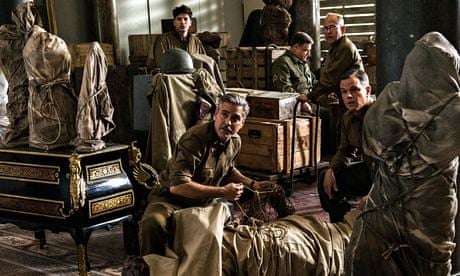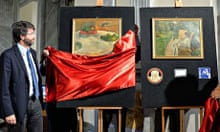No films about art stolen in wartime appear for years and then two come along at once: Wes Anderson's funny Grand Budapest Hotel, with a plot that revolves around the disappearance of a "priceless" painting called Boy with Apple, or the more serious and realistic The Monuments Men.
The latter is George Clooney's latest directorial venture and concerns an allied forces group of museum curators and art historians in the second world war who attempt to stop the Nazis destroying the cultural treasures of occupied countries.
One of the characters, on finding a stash of stolen art, tracks down the Parisian address of its rightful owners. The house he arrives at is abandoned, its Jewish occupants long since fled or taken. "They aren't coming back," his companion says. But nonetheless, he leaves the portrait of a woman hanging on the bare wall, staring out sadly, defiantly.
The questions raised about the value of culture and the importance of safeguarding it during armed conflicts resonate beyond the film, both in historical and contemporary contexts.
Cultural objects often become a part of conflict as aggressors and defenders seek to control their history and identity, and that of their enemies. This can take the form of controlling living artists through censorship and any resistance to this. For example, Emil Nolde, a German-Danish expressionist, painted miniature landscapes so he could hide his work when the Nazis searched his home for what they described as degenerate art.
It also takes the form of looting. There have recently been a number of high profile recoveries of stolen art. The Tate has just agreed to return Constable's Beaching a Boat, Brighton, which was looted and smuggled out of wartime Hungary.
There is also, of course, the destruction of buildings and archaeological sites. Since 2003 the British Museum has been involved in providing conservation and archaeological assistance to the Iraqis after the second Gulf war, and in 2008 alongside the British Army it carried out a survey of sites across southern Iraq with a view to preserving the cultural heritage.
The Hague convention for the protection of cultural property in the event of armed conflict, originally drawn up in 1954 and amended in 1999, is an international treaty that stemmed from the destruction and appropriation of cultural objects in the second world war.
The convention provides protection for cultural heritage in international law, prohibiting looting, theft, vandalism and reprisals against cultural property and barring the use of cultural property for military purposes except in exceptional circumstances. Importantly, it also forbids the export of cultural property from occupied territories and makes provision for the return of objects deposited with third-party territories for safekeeping during conflict.
Yet the UK is one of the only western powers not to have ratified the convention.
I am calling on the new culture secretary, Sajid Javid, to introduce legislation in the next Queen's speech to ratify the convention, and have asked a parliamentary question that will be addressed after Easter. Labour will back such a move if he agrees to this. There can be no excuse: the legislation was prepared by the last Labour government; the coalition has run out of ideas. Let's use the final year of this parliament to do something really useful on a cross-party basis.



